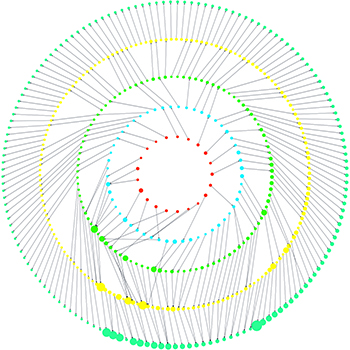Tracking the Evolution of Communities in a Social Network of Intellectual Influences
DOI:
https://doi.org/10.25517/jhnr.v7i1.146Keywords:
longitudinal analysis, social network analysis, history of intellectuals, dynamic networks, community detection, community evolution, big dataAbstract
The history of intellectuals consists of a long spanning entangled web of influences, interdependencies, and inspirations. In this paper, we con- strue the history of intellectuals with the means of a formalized network approach, and analyze structurally how communities form and develop based on their intellectual influences. We are working with a unique data set of Linked Open Data, which we critically reflect on. In this paper we tackle the question if community detection can help us to identify schools of thought, as well as patterns in the influence relations of scholars. We provide a detailed description of the process of extracting Linked Open Data, the construction of longitudinal networks, and the methodology of identifying and evaluating intellectual communities in the dataset using a community detection algorithm. Finally, we track the dynamic evolution of these communities in time, and characterize the structural patterns of their evolution, and the mechanisms of their development. We contextu- alize the changes in selected network structures in order to establish the merit of this method for a new perspective on the history of intellectuals, their influences, and their ideas.

Downloads
Published
How to Cite
Issue
Section
License
Copyright (c) 2022 Cindarella Petz, Raji Ghawi, Jürgen Pfeffer

This work is licensed under a Creative Commons Attribution-NoDerivatives 4.0 International License.
A Creative Commons Attribution-NoDerivatives 4.0 (CC BY-ND 4.0) license applies to all contents published in JHNR. While articles published on JHNR can be copied by anyone for noncommercial purposes if proper credit is given, all materials are published under an open-access license with authors retaining full and permanent ownership of their work. For details please consult the Open Access and Copyright Notice.

